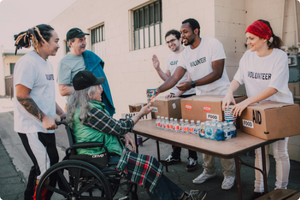Being kind is more than just a nice gesture – it’s a skill that can be developed and strengthened over time. By training your brain to be kinder, you can improve your relationships, boost your mental health, and create a more positive environment around you. In this blog post, we will cover seven effective ways to train your brain to learn kindness, backed by science and personal experience.
To train your brain to be kind:
- Practice daily gratitude
- Engage in empathy exercises
- Perform random acts of kindness
- Meditate on compassion
- Reframe negative thoughts
- Volunteer regularly
- Cultivate self-compassion
1. Practice Daily Gratitude
One of the most powerful ways to train your brain for kindness is through daily gratitude practice. When we focus on the good things in our lives, we naturally become more positive and open to showing kindness to others.
To start a gratitude practice:
- Keep a gratitude journal: Write down three things you are thankful for each day.
- Express appreciation: Tell someone why you are grateful for them.
- Reflect on positive experiences: Take a few minutes each evening to think about the good moments in your day.
I have been keeping a gratitude journal for the past year, and it’s amazing how much it has changed my perspective. Even on tough days, I find myself looking for silver linings and feeling more connected to the people around me.

2. Engage in Empathy Exercises
Empathy is the foundation of kindness. By putting yourself in someone else’s shoes, you can better understand their feelings and respond with compassion.
Try these empathy-building exercises:
- Active listening: Practice giving your full attention when others speak, without interrupting or judging.
- Perspective-taking: When faced with a disagreement, try to see the situation from the other person’s point of view.
- Read fiction: Studies show that reading fiction can improve empathy by allowing us to experience different perspectives.
I have found that practicing active listening has not only made me more empathetic but has also improved my relationships. People feel more valued when they know they are truly being heard.
Correlation Between Empathy Levels and Prosocial Behavior
| Empathy Level | Prosocial Behavior Score (out of 100) | Examples of Prosocial Behaviors |
| Very Low | 20-30 | Occasional help when explicitly asked |
| Low | 40-50 | Basic courtesy, rare volunteering |
| Moderate | 60-70 | Regular acts of kindness, occasional volunteering |
| High | 80-90 | Frequent volunteering, active community involvement |
| Very High | 90-100 | Daily acts of kindness, consistent volunteering, advocacy for others |
Note: This table is a simplified representation and actual results may vary. Empathy and prosocial behavior exist on a spectrum and can be influenced by many factors.
3. Perform Random Acts of Kindness
Small acts of kindness can have a big impact on both the giver and the receiver. By making kindness a habit, you are training your brain to look for opportunities to help others.
Ideas for random acts of kindness:
- Pay for a stranger’s coffee
- Leave a positive note for a coworker
- Help a neighbor with a chore
- Donate to a local charity
Now you know, go ahead and challenge yourself to perform at least one random act of kindness each week. It’s amazing how these small gestures can brighten someone’s day and leave me feeling more positive as well.
4. Meditate on Compassion
Meditation is a powerful tool for rewiring your brain, and compassion-focused meditation can specifically help you become kinder.
Try this simple compassion meditation:
- Sit comfortably and close your eyes.
- Take a few deep breaths to center yourself.
- Think of someone you care about and wish them well.
- Gradually extend those well-wishes to others, including strangers and even difficult people.
- Finally, direct compassion towards yourself.
5. Reframe Negative Thoughts
Our thoughts shape our actions. By reframing negative thoughts into more positive ones, we can train our brains to respond with kindness instead of judgment or criticism.
Steps to reframe negative thoughts:
- Notice the negative thought
- Challenge its validity
- Look for alternative explanations
- Replace it with a more balanced or positive thought
For example, if you think “That person is so rude,” try reframing it as “Maybe they are having a difficult day.” This shift in perspective can lead to a kinder response.
I used to be quick to judge others but practicing thought reframing has helped me become more understanding and patient. It’s not always easy, but it gets better with practice.
6. Volunteer Regularly
Volunteering is an excellent way to train your brain for kindness. It exposes you to different perspectives, builds empathy, and provides opportunities to practice compassion.
Benefits of volunteering:
- Increased sense of purpose
- Greater empathy and understanding
- Improved mood and reduced stress
- Expanded social connections
Find a cause that resonates with you and commit to regular volunteering. Whether it’s once a week or once a month, consistency is key to reaping the brain-training benefits.
My experience volunteering for free training has been transformative. Not only do I feel more connected to my community, but I have also noticed myself becoming more patient and compassionate in other areas of my life.

7. Cultivate Self-Compassion
To be truly kind to others, we must first learn to be kind to ourselves. Self-compassion involves treating yourself with the same kindness and understanding that you would offer a good friend.
Ways to practice self-compassion:
- Use positive self-talk
- Forgive yourself for your mistakes
- Take care of your physical and mental health
- Set realistic expectations for yourself
Learning self-compassion has been a game-changer for me. As I have become more gentle with myself, I have found it easier to extend that kindness to others.
Some studies have shown a strong positive correlation between self-compassion and prosocial behavior. To get a strong positive correlation between self-compassion and prosocial behavior, I recommend you:
- Searching academic databases like PsycINFO, Google Scholar, or PubMed.
- Check recent publications in journals focused on personality, social psychology, and mindfulness.
- Explore the work of researchers known for studying self-compassion, such as Dr. Kristin Neff.
- Visit the Center for Mindful Self-Compassion
Conclusion
Training your brain to be kind is a journey that requires patience and practice. By incorporating these seven strategies into your daily life, you can rewire your brain to respond with more empathy, compassion, and kindness. Remember, every small act of kindness counts and contributes to a more positive world.
As you embark on this journey to train your brain for kindness, be patient with yourself. Like any skill, kindness takes time to develop. But with consistent practice, you will notice positive changes in your thoughts, actions, and relationships.
Share your experiences and let’s inspire each other to create a kinder world, one brain at a time.
Frequently Asked Questions
- How long does it take to train your brain to be kinder? The time it takes to train your brain for kindness varies from person to person. Consistent practice of kindness-building exercises can lead to noticeable changes in a few weeks, but significant rewiring of the brain may take several months of dedicated effort.
- Can kindness be learned, or is it just an innate trait? While some people may be naturally inclined towards kindness, research shows that kindness is indeed a skill that can be learned and developed through practice. The brain’s neuroplasticity allows us to form new neural pathways associated with kind behavior.
- Are there any scientific benefits to being kind? Yes, numerous studies have shown that practicing kindness can lead to increased happiness, reduced stress, improved cardiovascular health, and stronger social connections. It also triggers the release of oxytocin, often called the “love hormone,” which promotes bonding and well-being.
- How can I remember to practice kindness in stressful situations? Creating a kindness cue or mantra can help. For example, you might wear a bracelet that reminds you to pause and choose kindness, or set a phone reminder with a compassionate message. Regular meditation can also help you respond more calmly in stressful moments.
- Is it possible to be too kind? While kindness is generally positive, it’s important to maintain healthy boundaries. Being kind doesn’t mean sacrificing your well-being or allowing others to take advantage of you. Self-compassion and self-care are crucial components of sustainable kindness.
- How can I teach kindness to children? Model kind behavior, praise acts of kindness when you see them, and create opportunities for children to practice kindness. Reading books about kindness, role-playing scenarios, and engaging in family volunteer activities can also help instill kindness in children.
- Can practicing kindness help with mental health issues like depression or anxiety? While not a substitute for professional treatment, practicing kindness has been shown to have positive effects on mental health. It can boost self-esteem, reduce symptoms of depression, and alleviate anxiety by shifting focus away from oneself and fostering social connections.
- How does kindness relate to emotional intelligence? Kindness is a key component of emotional intelligence. It involves empathy, social awareness, and relationship management – all crucial aspects of EQ. Practicing kindness can help improve overall emotional intelligence.
- Are there any downsides to training your brain to be kind? There are no significant downsides to becoming kinder. However, it’s important to maintain a balance and not neglect your own needs in the process. Learning to be kind to yourself is just as important as being kind to others.
- How can I measure my progress in becoming kinder? While kindness isn’t easily quantifiable, you can track your progress by keeping a journal of your kind acts, noting changes in your relationships, and paying attention to how you feel. You might also ask trusted friends or family members if they’ve noticed any changes in your behavior.










